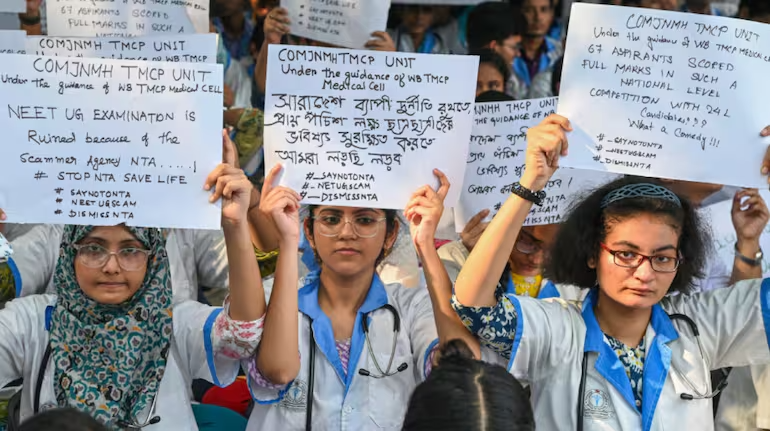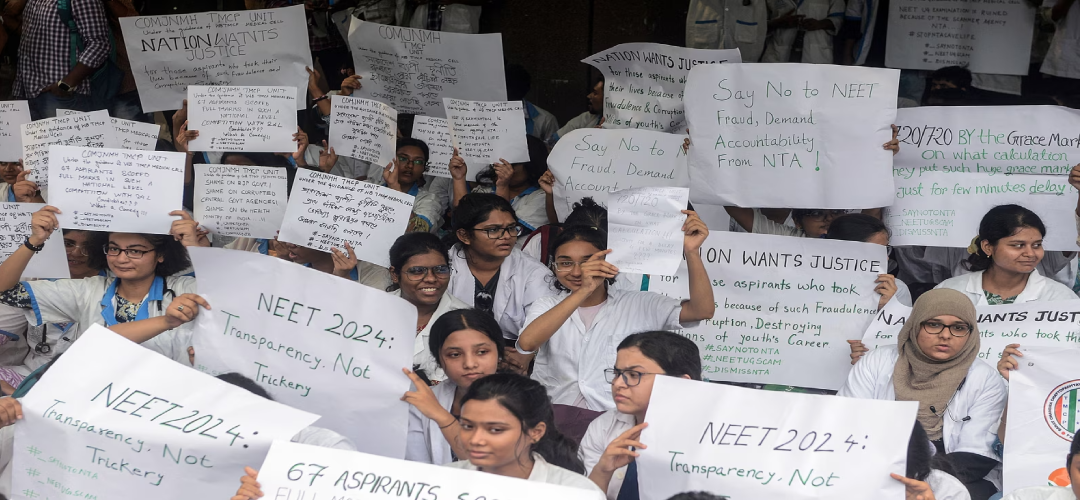The Great Indian Medical Scam has put our higher education system under a microscope.
In recent years, Indian students have faced many uncertainties, particularly in their education and career pursuits. Medical students and the public have expressed dissatisfaction with the National Testing Agency’s (NTA) handling of the NEET UG 2024 results. They are calling for the cancellation of the results, a thorough investigation into allegations of exam discrepancies, and a refund.
This year, over 23 lakh students took the NEET exam, and their futures now hinge on the actions of potentially incompetent bodies. With only 91,907 MBBS seats and 26,949 BDS seats on the table, the odds of securing a place were a daunting 4 per cent. Hence, the allegations that unfair means were resorted to grant seats to undeserving candidates.
The NTA has responded by announcing a panel to re-examine the results of over 1,563 students awarded grace marks in the NEET UG 2024. This panel reviews the results and submits a report within a week. The controversy surrounding the exam and its results has led to widespread accusations of a scam involving aspirants, parents, and politicians alike.
Background
This situation can be likened to a ship navigating treacherous waters. Students are the passengers, full of hope and aspirations, while the NTA is the crew responsible for steering them safely to their destination. However, instead of a smooth journey, the crew’s missteps have led the ship into controversy and uncertainty, leaving the passengers anxious and adrift, unsure if they will ever reach the shores of their dreams.
This year, 67 students received the coveted All India Rank 1 (AIR 1), achieving a perfect score of 720/720 in the NEET exam. This starkly contrasts the preceding five years when only two to four students typically achieved this honour. The sudden surge in high performers has raised suspicions among stakeholders, prompting calls for an investigation into the evaluation process. This situation can be compared to a sudden bloom in a desert. For years, only a few flowers thrived in the harsh conditions, symbolising the few students who attained perfect scores. Suddenly, this year, the desert is unexpectedly filled with many blooming flowers, raising questions about whether natural conditions could have changed so drastically overnight or if something artificial is influencing this sudden abundance.
The information that six of the 67 students who achieved Rank 1 are from a single Haryana examination centre heightens scepticism. This concentration of high achievers from a specific area raises concerns regarding the fairness and impartiality of the examination administration. As one concerned parent said, “When so many top scores come from a single centre, it’s hard not to question whether the system is truly impartial and fair to all students.”.
After students filed cases in high courts in Punjab, Delhi, Haryana, and Chhattisgarh, saying they were delayed by several centre-related problems, including the distribution of incorrect question papers, about 1,563 students were granted grace marks. According to the NTA, a committee created a mechanism to remedy this issue that the Supreme Court authorised in a 2018 ruling; as a result, applicants from the impacted centres received grace marks. Since then, candidates have claimed that hundreds of marks were given as grace marks, but the NTA has refuted these allegations.
Moreover, two candidates scored 718 and 719 out of 720 in NEET 2024, which is impossible per the marking scheme. For every right answer, the student gets four marks, and for every wrong answer, one mark is deducted; within this mathematical framework, it is mathematically impossible to score 718 or 719. Critics are sounding the alarm for fraud concerning this flaw. The NTA justified this by stating that the student received grace marks. Moreover, 1563 students have also been given grace marks for unknown reasons, and the response from the NTA is derived from the norms set by the Supreme Court on the 13th June 2018 order. However, the referred order was met only for CLAT exams, not NEET.
Additionally, media sources claimed that some exam centres had leaked the NEET UG question paper before the test’s May 5 start date. According to a Times of India story, the police have opened cases in at least three of these reported cases. After looking into one of the cases, the Bihar police’s Economic Offences Unit (EOU) discovered that the parents of the children had paid almost Rs 50 lakh to have the question paper leaked. Up to thirteen individuals, including parents and applicants, were detained by the EOU in Bihar. Because of these allegations, activists claim that the NTA should not have announced the results, denying students a fair and equal opportunity to compete. The NTA, however, has insisted that every question paper was accounted for and that any allegations of purported paper leaks were unfounded. However, there was more reason for concern when eight students—reportedly from the same Jhajjar, Haryana exam centre—scored 720/720 and were listed among the 67 students who achieved a flawless score.
A controversy arose over an incorrect answer key for a Physics exam. Thirteen thousand students challenged it because there were two possible answers. Some skipped the question, losing four marks. The incorrect answer key resulted in five grace marks for those who chose the correct answer. Students demanded the National Testing Authority (NTA) remove the question or award grace marks to all exam-taking students. Forty-four students received perfect scores.

Analysis
Hopefully, judicial intervention will put things right and punish the culprits. A PIL has been filed in the Supreme Court. In an era where India is plagued with large-scale student suicides due to failure to clear competitive examinations, it is a sad commentary on the nation’s governance that a critical field of higher education, like medicine, can be culpable of such large-scale mismanagement.
It is quite apparent that the system has flaws that unscrupulous elements have allegedly exploited. It appears that officials in the NTA and the Education Ministry have taken students’ lives for granted.
India’s 1.4 billion strong populace is seriously short of doctors per global averages. The scarcity of medical colleges contributes to the mad scramble for the limited seats that fall vacant yearly. Clearly, India needs more well-equipped medical colleges, albeit genuine ones, and not fly-by-night operators that can hardly qualify as medical training institutions.
Assessment
- The NEET Exam was designed to replace many medico-educational discrepancies already present as different states had different exams; seats were being sold to the highest bidder, turning the medical education system into a bazaar. Clearly, the system has failed to deal with these maladies and perhaps added to the already existing problem.
- The judiciary and the central government must first step in to deal with the entrance to the 2004 batch of students and, as a longer-term measure, wrinkle out the loopholes in the selection system to make it transparent, fair, and with no scope for manipulation.




